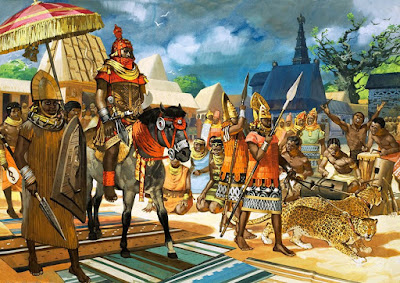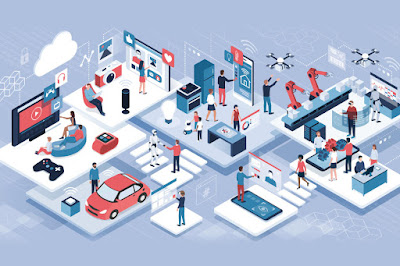You are getting...
- The Origin and Evolution of Business
- The History of Business
- Business From Ancient To Modern Age
The origin and development of business are inextricably linked with the development of human civilization.
In the primitive age, people used to fulfill their own needs by themselves. At that time, human needs were limited by filling their hungry.
The boundaries of human needs or wants continually growing day by day. People have been trying to fill up this gap of demand for a long time. But it was not possible.
Due to the labor division, there is a surplus production on one side but on the other side, the shortage remains incomplete.
As a result, it has started exchanging goods with others at its own risk to meet the needs of others.
Later, due to various reasons, the exchange system was not very convenient. As a result, gold, silver, and other precious metals were gradually introduced as a medium of exchange. This made the exchange system easier and different types of businesses emerged. A group of businessmen emerged to make a profit.
At that time production was mainly limited to
agriculture, hunting, animal husbandry, and handicrafts. This system of
production, which is dependent on manual labor, has evolved over a long
period in various societies, but it has not been able to overcome the
limitations.
Later, the development of mechanical civilization
create opportunities for mass production. And thus we are currently
experiencing the existence of a global market.
The various stages of this long evolution of business are discussed below:
A) Initial Stage
The people of this age were completely dependent on nature. At that time, the main occupation of the people was to collect fruits from the forest and fishing.
1.
Primitive Stage:
For a long time after the arrival of man on earth, a
man was a nomadic nomad. Humans were subsisting on hunting and gathering
fruits for their subsistence.
Humans were subsisting on hunting and gathering fruits for their subsistence. Gradually people started living in groups.
At this stage, the lack of textile or dresses and accommodation is felt acutely. Gradually people living somewhat permanently actually mastered the technique of land cultivation by the people.
People started raising animals. At this time the domestic
economy did not originate.
2. Direct Exchange:
At the primitive
age, the production systems are seen to revolve around the family needs.
But later it is seen that each family acquired special skills to produce one product at a time.
As a result, more production can be observed in any subject and deficit can be observed in any case. This means that a family is deficient in the ability to produce one product but not another. So this makes demand different.
As a result, quotes need to be invested. Thus the exchange system or Barter System was introduced or invented.
At one
stage, the business started its journey through the exchange system.
But in a short time, lack of consistency, difficulty in dissolving
liquids, this system failed and failed to meet the needs of the people.
B) Middle Age
The
middle age of business was started from a barter system to an
industrial revolution. In the Middle Age of business, the production and
distribution systems were improved.
1. Introduction of Money:
In
the context of the futility of the exchange system, people are looking
for a means of exchange to meet their needs.
In a different society, rare snails, oysters, stones, etc. were used as a means of exchange at this stage.
As a result, there was some expansion in the transactions. Such transactions take the shape of a business.
Later, when the society or the state system became somewhat self-sufficient, the king or the socialist introduced a valuable coin.
This system makes it easier to pay rent, wages, etc. in addition to buying and selling goods.
As a result,
the widespread circulation of the labor department and the level of business activity increased tremendously.
2. Growth of Market and Town:
After the introduction of money, the business expanded and
markets were created in different places for transactions.
Urban life emerged there at one stage as the population gradually increased in these areas.
At this time the production of various industrial products started trying to meet the needs of city people. Boats and animal-powered vehicles are used to transport goods.
At this time, the security problems became apparent when it came to bringing goods. There is also became a question of the possibility of fraud and mistrust in the conduct of business for far and wide.
As a result, the
Merchant guild and Craft guild was formed. Which play a major role in
the development of business and trades.
3. Colonization:
Even if
trade and commerce developed in different parts of the world, In the
Mediterranean region trade and commerce were the most developed.
As a result, traders or businessmen in the region are looking for new markets to sell their products. During this time many European companies tried to establish colonies in the name of trade and commerce in different parts of the world.
European companies reached the golden age of prosperity overnight by procuring low-cost raw materials from the colonies and selling high-value industrial goods.
Out of these companies, the East India Company gained the dominant position beyond the boundaries of trade and commerce of the Indian subcontinent as like as Hudson's Bay Company took the position in North America and Muscovy Company took position to Russia.
In this way, at this stage, trade and commerce were able to expand internationally.
C) Modern Stage:
The
different types of profitable businesses were started in the modern
stage. From the industrial revolution to the present time is called the
Modern Stage.
1. Industrial Revolution:
By the end of the Middle
Ages, trade had improved considerably, but traders couldn't meet the
growing needs of society with muscle-dependent production systems.
So between 1750 and 1850, some groundbreaking inventions revolutionized the system of production and distribution in business history. The invention of the steam engine by James Ward leads the development of mechanical power.
Spinning Jenny was invented in 1764 or 1765 by James Hargreaves, Power Loom was invented by Kay, Arkwright invented Water Frame, Compton has invented Soul and The invention of all these instruments played a huge role in the progress of the weaving industry.
Thus the revolutionary progress that took place in the industrial world of Europe between 1750 and 1850 is called the Industrial Revolution. This revolution led to the development of industry and took place of the long-standing family production system and resulted in mass production and distribution.
The use of mechanical energy led to the expansion of the transport system.
2.
Development of Technology and Modernization:
As a result of the
Industrial Revolution, various types of industrial factories were
established in the country, and abroad and this led to massive economic
progress.
An environment of widespread competition is created internationally, and as a result, the product quality and new experiments were increased and running research to reduce costs.
Due to all these activities, technological development became widespread. The use of these new technologies accelerates the further development of business. This is how we entered today the world of computer technology.
The global market and the free market economy are proving the highest respect and development in the business today.


